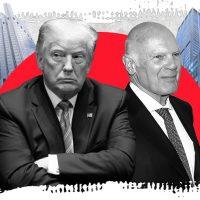Despite the cloud of uncertainty hanging over New York City real estate in recent months, Vornado Realty Trust’s latest earnings call started on a positive note thanks to Facebook’s finalized deal to lease the Farley Post Office redevelopment.
“We normally don’t go for the drama of timing deals with earnings calls, but this one just worked out that way,” CEO Steve Roth said on Tuesday’s call, referring to the announcement the day before that the social media giant was taking the entire 730,000-square-foot development.
“People have been speculating: Will even a great company such as Facebook commit in the middle of the pandemic crisis? Will they commit to physical assets in spite of all the work from home stuff? Will they continue to expand in New York, in effect doubling down? We now know the answer to these questions is yes,” Roth continued.
The deal makes the social media giant Vornado’s largest tenant by both revenue and floor area. In response to analysts’ questions about what the deal would mean for Facebook’s current space at 770 Broadway, Roth noted that the tech company has talked about expanding further at that property as well, possibly taking up the entire building.
During the second quarter, Vornado collected 88 percent of rent due from tenants, or 94 percent including rent deferrals. This consisted of 93 percent from office tenants (98 with deferrals) and 72 percent from retail tenants (78 with deferrals). Deferred rent is generally required to be paid back over a 12-month period.
The REIT recorded a net loss of $198 million for the quarter, or $1.03 per share, compared to net income of $12.56 per share for the same period a year prior. The loss was largely a result of a $306 million impairment loss on Vornado’s Fifth Avenue and Times Square retail joint venture, which the firm disclosed in late July.
Read more




The quarter also saw two of the company’s retail tenants — J.C. Penney and New York & Company — fall to bankruptcy. Vornado’s New York retail occupancy has dropped from 94.5 percent at the end of 2019 to 83.6 percent at present, largely due to the termination of J.C. Penney’s 154,000-square-foot lease at the Manhattan Mall.
While the J.C. Penney space could be re-leased to another retailer, Roth noted that it could also be turned into a last-mile distribution center. “That’s the hottest business in the country right now,” he said, noting that the property is “brilliantly located in the middle of the island.”
The J.C. Penney department store has a very large shipping and receiving component which could be further enlarged, Roth said, although “I do not believe that you should expect that we’re going to re-let this space quickly. This will be a long, slow slog.”
Vornado’s 220 Central Park South luxury condo development continues to be a “financial engine” for the firm, pushing the firm’s total liquidity to $3.8 billion dollars. “If you’ll pardon the expression — we’re loaded,” Roth said. “We didn’t see the pandemic coming, but we saw the end of a long expansion coming, and so we prepared for this.”
And the company is set to become even more loaded going forward, as it seeks to re-capitalize two properties that it co-owns with President Trump — 1290 Sixth Avenue in Manhattan and 555 California Street in San Francisco. “Our objective is to take capital out of mature buildings and have it available for more advantageous opportunities,” Roth said of those plans.
Regarding the decision to re-capitalize these trophy assets rather than other lower-quality properties, Roth said that “it was our judgment, collectively… that in this very sloppy market, it would take an extraordinary building to get investors’ attention and to get a price or value that’s appropriate.”
Roth noted that plans for the properties are still “fluid” and may result in outcomes other than sales. The San Francisco property in particular has a low loan-to-value ratio, so a refinancing could also produce “robust” proceeds.
He also dismissed the idea that the buildings’ association with Trump could draw negative media attention: “With respect to the fact there is a partner in the building: he doesn’t have anything to say about the decisions that we make, so that’s fine.”
Regarding the longer-term impact of the pandemic, Roth acknowledged that “it may even take a couple of years for New York’s ecosystem — tourism, sports, concerts, Broadway, museums, restaurants, nightlife, et cetera — to return to normal levels” but added that “the time to invest is when things look a little bleak.”
While capital markets are currently “sticky” due to uncertainty, he said, “that will all change” in the next 12 to 18 months. “There’s a flood of liquidity, the chaos and the fog will begin to start to lift, and it will become an aggressive borrowers’ market.”
“If you put our balance sheet together with a borrowers’ market and low interest rates, et cetera, this is a good, good time to be in our business,” he concluded.
Contact Kevin Sun at ks@therealdeal.com.
